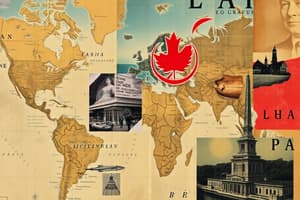Podcast
Questions and Answers
Which branch of geography focuses on natural processes and features such as landforms and ecosystems?
Which branch of geography focuses on natural processes and features such as landforms and ecosystems?
- Geospatial Technologies
- Cultural Geography
- Physical Geography (correct)
- Human Geography
What term describes the specific position of a place on the Earth?
What term describes the specific position of a place on the Earth?
- Movement
- Place
- Region
- Location (correct)
Which of the following best characterizes Human Geography?
Which of the following best characterizes Human Geography?
- It focuses solely on physical landscapes.
- It studies climates and natural resources.
- It analyzes only demographic statistics.
- It examines urban development and social structures. (correct)
Which of these themes in Human Geography involves the study of migration patterns and demographics?
Which of these themes in Human Geography involves the study of migration patterns and demographics?
What is the significance of understanding geography in disaster management?
What is the significance of understanding geography in disaster management?
Flashcards are hidden until you start studying
Study Notes
Definition of Geography
- Study of the Earth's landscapes, environments, and the relationships between people and their environments.
- Encompasses both the physical features of the Earth and human activities.
Branches of Geography
-
Physical Geography
- Focuses on natural processes and features (landforms, climates, ecosystems).
- Studies Earth's structure, processes, and natural resources.
-
Human Geography
- Examines human activities, cultures, economies, and their interactions with the environment.
- Looks at urban development, population distribution, and social structures.
-
Geospatial Technologies
- Utilizes tools like GIS (Geographic Information Systems), GPS (Global Positioning System), and remote sensing.
- Helps in mapping, analyzing, and managing spatial data.
Key Concepts in Geography
- Location: Refers to the specific position of a place on the Earth (absolute vs. relative).
- Place: Describes the physical and human characteristics that define a location.
- Human-Environment Interaction: Explores how humans adapt to and modify their environment.
- Movement: Investigates the flow of people, goods, and ideas across the planet.
- Region: An area defined by certain unifying characteristics (physical, cultural, political).
Physical Geography Features
- Landforms: Mountains, valleys, plateaus, plains, and hills.
- Climate Zones: Tropical, arid, temperate, polar, and highland.
- Ecosystems: Biomes such as forests, deserts, grasslands, and tundras.
Human Geography Themes
- Population Geography: Studies population dynamics, migration patterns, and demographics.
- Cultural Geography: Examines cultural norms, languages, religions, and traditions.
- Economic Geography: Focuses on how economic activities are distributed and their impact on places.
Importance of Geography
- Helps understand spatial relationships and patterns.
- Informs planning and management of natural resources.
- Aids in disaster management and environmental conservation.
- Enhances global awareness and cultural understanding.
Definition of Geography
- Geography studies Earth's landscapes, environments, and human-environment relationships.
- It incorporates both physical features and human activities.
Branches of Geography
- Physical Geography
- Investigates natural processes and features such as landforms, climates, and ecosystems.
- Analyzes Earth's structure, processes, and available natural resources.
- Human Geography
- Explores human activities, cultures, economies, and their environmental interactions.
- Covers urban development, population distribution, and social structures.
- Geospatial Technologies
- Employs tools like Geographic Information Systems (GIS), Global Positioning Systems (GPS), and remote sensing.
- Facilitates mapping, analysis, and management of spatial data.
Key Concepts in Geography
- Location
- Refers to a place's specific position (absolute and relative location distinctions).
- Place
- Encompasses the physical and human attributes defining a location.
- Human-Environment Interaction
- Examines how humans adapt to and alter their environment.
- Movement
- Investigates the circulation of people, goods, and ideas globally.
- Region
- Identifies areas characterized by unifying physical, cultural, or political traits.
Physical Geography Features
- Landforms
- Includes mountains, valleys, plateaus, plains, and hills.
- Climate Zones
- Categories such as tropical, arid, temperate, polar, and highland climates.
- Ecosystems
- Biomes include forests, deserts, grasslands, and tundras, each with unique environmental features.
Human Geography Themes
- Population Geography
- Analyzes population dynamics, migration trends, and demographic characteristics.
- Cultural Geography
- Focuses on cultural practices, languages, religions, and traditions within diverse communities.
- Economic Geography
- Investigates the spatial distribution of economic activities and their effects on regions.
Importance of Geography
- Enhances understanding of spatial relationships and distribution patterns.
- Assists in the planning and stewardship of natural resources.
- Plays a vital role in disaster response and environmental conservation efforts.
- Promotes global awareness and a deeper cultural understanding among societies.
Studying That Suits You
Use AI to generate personalized quizzes and flashcards to suit your learning preferences.




